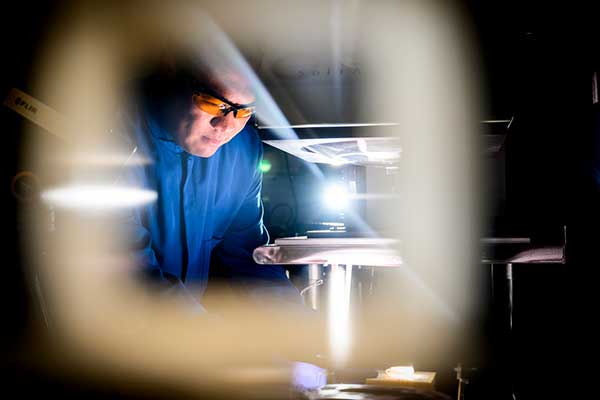Zheng Selected as Fulbright Scholar Awardee

MIE Associate Professor Yi Zheng was selected to receive the distinguished Fulbright Scholar Award for 2025-2026. Sponsored by the U.S. Department of State, this prestigious fellowship will enable Zheng to conduct research on innovative interfacial water desalination technology at the University of Technology Sydney in Spring 2026. Fulbright Scholar Awards are prestigious and competitive fellowships that provide unique opportunities for scholars to teach and conduct research abroad.
This article originally appeared on Northeastern Global News. It was published by Cyrus Moulton. Main photo: Northeastern University professor Yi Zheng is further developing his solar-powered water desalination system as a Fulbright Scholar in Australia. Photo by Matthew Modoono/Northeastern University.
From crab shells to potable water: Solar-powered desalination system earns Northeastern professor a Fulbright
Northeastern University professor Yi Zheng sees two major sustainability issues facing humanity: limited energy and water.
His solar-powered desalination system addresses both. Oh, and it’s made from crab shells and cuttlefish ink.
“There are over 8 billion people in the world right now, and energy and fresh water scarcity are two major issues humans are facing,” says Zheng, an associate professor of mechanical and industrial engineering at Northeastern. “If I can contribute a little bit to save more energy or to generate low-cost, affordable fresh water, that will be great.”
Zheng studies nanoscale functional materials for freshwater generation, especially those utilizing solar energy, and has an interest in sustainability.
He explains that the commonly used desalination systems use reverse osmosis technology, where added pressure forces seawater through a semi-permeable membrane to make it salt-free.
The process is efficient; however, it also requires land, facilities, equipment and electricity.
“It may not be available in some remote regions or off-grid regions,” Zheng says. “So that pushed me to study an affordable and eco-friendly approach: solar-driven water desalination.”
The result?
A porous hydrogel made of crab shells and cuttlefish ink that floats on the surface of the ocean, absorbing seawater on its bottom and sunlight on its top. The hydrogel filters the seawater, it evaporates in the sun onto a transparent cover that is connected to a removable water collection tank.
Read full story at Northeastern Global News